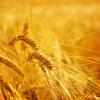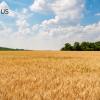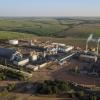The research focus of IBF is the integrated modeling of natural resources and ecosystems management using IIASA models such as the Global Biosphere Management Model (GLOBIOM) for the development of transformations in food and bio-based sectors that enable satisfying human needs while ensuring the sustainable use of terrestrial and marine environments.
The IBF Group strives to bring about transformations in the use and management of terrestrial, fresh water, and marine ecosystems for “happy people on a healthy planet” by informing national and international policies, and by engaging with businesses and civil society. For this, the group relies on a suite of well-established models, including the Global Biosphere Management Model (GLOBIOM) and the Global Forest Model (G4M), as well as its reputation as a credible partner in concrete policy/regulatory processes.
The group’s key research areas include:
- Land, water, and oceans management focusing on primary producers in agriculture, forestry, and fisheries and their impact on the environment, including land-based climate change mitigation.
- Bio-based sectors integrating consumers and producers across food, fibre, and fuel supply chains.
- Shocks, adaptation, and resilience within bio-based sectors including weather extremes.
- Food, nutrition, and poverty, as the main social outcomes of land, water, and oceans use.
- Integrated biosphere foresight and solutions developing forward-looking scenarios for the assessment of potential synergies and trade-offs between relevant Sustainable Development Goals at regional and global scales, and exploring national and international options for their achievement to inform policymaking.
Projects
Staff
News

20 January 2025
SPARCCLE Workshop Gathers EU Policymakers for Policy Feedback and Insights
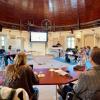
05 November 2024
SPARCCLE Consortium Marks One-Year Milestone with In-Person Meeting and Workshops
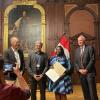
11 October 2024
Felicity Addo receives ÖGA Award for her thesis
Events
Focus

13 February 2025
New water withdrawal projections for Europe suggest more people will live in water-stressed areas
As water demand continues to rise across Europe, new analysis reveals that more people than previously estimated will face water stress in the coming decades. IIASA researchers working on the EU-Horizon ACCREU project highlight the urgent need for informed adaptation strategies.
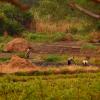
08 July 2024
Future food demand in The Gambia: can increased crop productivity and climate adaptation close the supply–demand gap?
The Gambia faces significant food availability issues due to low agricultural productivity. IIASA researchers and colleagues used the FABLE Calculator to explore actions to reduce the food supply-demand gap by 2050. The results, published in Food Security, reveal that current cropland will not meet food demand by 2050.
Publications
Hemerijckx, L.-M., De Vos, K., Kaunda, J.O., & Van Rompaey, A. (2025). Future scenarios for urban agriculture and food security in sub-Saharan Africa: Modelling the urban land-food system in an agent-based approach. Computers, Environment and Urban Systems 118 e102258. 10.1016/j.compenvurbsys.2025.102258. Krisztin, T. , van Dijk, M. , & Piribauer, P. (2025). Herding resilience: Surveys and Bayesian spatial models for Africa’s livestock. Environmental Development 54 e101141. 10.1016/j.envdev.2025.101141. Pan, Y., Sha, A., Han, W., Liu, C., Liu, G., Welsch, E., Zeng, M., Xu, S., Zhao, Y., Tian, S., Li, Y., Deng, R., Zhang, X., Shi, H., Cui, Y., Huang, C., & Peng, H. (2025). Identifying spatial drivers of soil heavy metal pollution risk integrating positive matrix factorization, machine learning, and multi-scale geographically weighted regression. Journal of Hazardous Materials 485 e136841. 10.1016/j.jhazmat.2024.136841. Figueira, M., Guarner, C., Conesa, D., López-Quílez, A., & Krisztin, T. (2025). Unveiling Land Use Dynamics: Insights from a Hierarchical Bayesian Spatio-Temporal Modelling of Compositional Data. Journal of Agricultural, Biological and Environmental Statistics 10.1007/s13253-025-00678-6. Aguilar-Garavito, M., Isaacs-Cubides, P., Peña-González, N., & Warren-Thomas, E. (2025). Challenges for policy and practice in meeting ambitious ecological restoration targets by 2030: A perspective from Colombia. Biological Conservation 302 e110973. 10.1016/j.biocon.2025.110973. Ermolieva, T. & Komendantova, N. (2025). Modeling and managing systemic risk and food - water - (bio)energy security nexus in interdependent land use systems. In: 19th International European Forum (IGLS-Forum), 10-14 February 2025, Garmisch-Partenkirchen, Germany.



